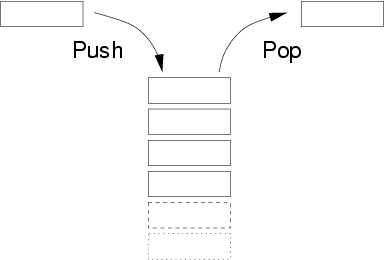LIFO
|
|

In computer science and queueing theory, LIFO (last in, first out) refers to the way items stored in a data structure are processed. The last data to be added to the structure will be the first data to be removed. LIFO mechanisms include data structures such as stacks.
A LIFO structure can be illustrated with the example of a crowded elevator. When the elevator reaches its destination, the last people to get on are typically the first to get off.
In accounting, LIFO has historically been used to record the value of inventory. However this method rarely reflects the underlying commercial substance (perhaps a heap of coal with shipments being added to and taken from the top might be an isolated case) and is therefore effectively outlawed under UK GAAP and IAS.
LIFO valuation is permitted under US GAAP and, where prices are increasing, is used by some companies to save money in taxes. LIFO generally lowers net profit, resulting in a tax savings and therefore higher cash flow.
See also: FIFO (First in, first out)de:Last In - First Out es:LIFO fr:Last in, first out lt:LIFO nl:Lifo
